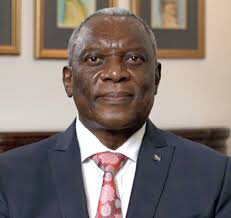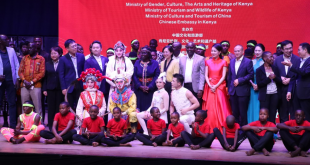Published: January 20,2022

By Siyabonga Cwele
Political Relations
Political and People-to-People Relations between the People’s Republic of China (PRC) and South Africa dated back to the liberation movement from the early 1950s and continued until the dawn of democracy in South Africa in 1994. The official diplomatic ties between South Africa and China were established in 1998 and are underpinned by the Comprehensive Strategic Partnership (CSP), as well as the Five to Ten Year Strategic Programme of Action.
The latter is replaced by the 10 Years Strategic Programme on Cooperation (2020-2029). The CSP prioritises enhancing frequent high level political exchanges and advancing trade and investment. To this end, bilateral mechanisms such as The Bi-National Commission (BNC), The High Level People-to-People Exchange Mechanism (PPEM), The Joint Working Group (JWG) and The Strategic Dialogue have been established to facilitate and enhance political interests and economic objectives of the diplomatic relations.
In July 2018, Chinese President Xi Jinping paid a State Visit to South Africa during 10th Summit of BRICS; and in September 2018, President Cyril Ramaphosa paid a State Visit to China and co-chaired the 7th Summit of FOCAC. President Cyril Ramaphosa congratulated the Communist Party of China on the 100th Anniversary of its founding of on 1 July 2021 and participated in the World Political Parties Summit hosted by President Xi Jinping. South Africa and China’s well-established diplomatic relations were further strengthened and boosted in this display of cooperation.
From a multilateral perspective, South Africa and China are close allies, particularly within the contexts of the BRICS, the Forum on China-Africa Cooperation (FOCAC), Belt and Road Initiative (BRI), and many other international mechanisms, to jointly safeguard multilateralism and promote a more just and equitable international order.
South Africa and China have enjoyed growing mutual political trust and the bilateral relations at present are at its historical height. I believe that the two countries will fully explore the multitude of opportunities to deepen the sustainable and win-win bilateral relations at all levels.
Trade and Economic Relations
Our trade activities have recorded positive progress. Since 2009, China has been the largest trade partner of South Africa and likewise, South Africa is China’s largest trading partner in Africa. In 2019 China’s total imports and exports with Africa were US$207 billion, of which South Africa accounted for US$42.5 billion or 21%, followed by Angola at 12%, then Nigeria and Egypt respectively.
On the occasion of the recently concluded Eighth Ministerial Conference of the Forum on China-Africa Cooperation (FOCAC) held on the 29-30th November in Dakar, President Xi Jinping made the important announcement of the nine programmes of future cooperation between China and Africa. Key in this regard was President Xi’s focus on the trade promotion program, which “in a bid to reach US$300 billion in total imports from Africa in the next three years, China will provide US$10 billion of trade finance to support African exports to China”. Further, in terms of the investment promotion program, President Xi continued that “China will encourage its businesses to invest no less than US$10 billion in Africa in the next three years, and will establish a platform for China-Africa private investment promotion.”
South Africa is ready to work with China in implementing these important programmes. The attraction of Chinese investment is a key priority for South Africa. In 2018, President Cyril Ramaphosahosted the inaugural Presidential Investment Conference in Johannesburg and announced government’s objective to raise US$100 billion in new investments over five years with a view to increasing economic growth and creating more employment opportunities. In that year 31 investment projects were announced, totallingRMB128 billion.
By the end of the 2019 conference, local and international investors responded to our President’s call, and RMB165 billion of investment announcements were made. Of particular significance was the strong Chinese delegation of over 50 individuals that attended, representing a diverse range of sectors from mining to telecoms. This is a reflection of the large Chinese community residing in South Africa, and over 600 large and medium sized Chinese companies already invested and operating successfully within South Africa.
Indeed, we have a lot to offer, in the form of our people, in natural and mineral resources, with a young and able workforce, world-class infrastructure, sophisticated telecommunications systems, and a well-regulated financial and banking sector, which is rated 19th by the World Economic Forum.
South Africa and its government provides the political and policy certainty to allow an enabling environment for business to grow and operate where their investment would be protected.
There is the rule of law in South Africa, the judiciary is independent and the legal framework is strong, especially around commerce, taxation, maritime issues, competition law, intellectual property, property rights and other basic human rights. On July 13, 2018, the Protection of Investment Act came into operation, providing a degree of protection to investors in relation to their investments and aiming to achieve a balance of rights and obligations that apply to all investors.
Central to our efforts to ignite growth and create jobs is an ambitious execution oriented industrial strategy founded on partnerships between government, labour and industry. It prioritisesgrowth in important sectors such as automotive, clothing and textiles, gas, chemicals and plastics, tourism, renewable energy, oceans economy, agriculture, mining and beneficiation, the digital economy and the high-tech industries.
We have identified Special Economic Zones as platforms that can attract investors and enhance economic growth. With the assistance of China to build capacity and train our officials, we have established 10 Special Economic Zones in strategic locations around the country such as Durban, Johannesburg, Pretoria and Port Elizabeth, where investors are able to produce and export value-added products. Investors are offered a preferential corporate tax regime, building support, employee tax incentives, favourable customs regulations and support for capital investment and training. Recently a new automotive special economic zone was launched in Gauteng Province.
Rapid industrialisation is critical if we are to reap the benefits of the African Continental Free Trade Area, which entered its implementation phase in January 2021. This historic development promises to fundamentally reshape African economies. The Continental Free Trade Area will improve access to existing African markets and lead to the creation of new ones. This treaty will unleash the manufacturing and industrial capability of the continent as companies seek to make products for the growing African market of 1.37 billion people.
Through the expanding network of government’s “Invest South Africa’s” “One-Stop Shops” we are working to remove bureaucratic and administrative hurdles to investment, providing new entrants with a single contact point for licensing and regulatory compliance.
South Africa’s export basket is comprised of a wide range of minerals that include iron ore, coal, manganese, platinum group metals, chromium, and gold. Apart from this, a huge range of chemicals and food items such as wines, tobacco, beef, juices, rooibos tea, honey bush tea, table grapes, maize and processed foods such as biscuits, raisin, nuts, sauces and petro chemical products are exported to China. The two countries are in the process of developing protocols for the export of additional South African agricultural products such as pears, avocadoes, soya beans, dairy products, aquaculture products, and pet food.
South Africa is currently modernising and expanding its ports. The three international airports in Johannesburg, Durban and Cape Town offer faster movement of precious and perishable goods between China and South Africa. The inland City Deep Port in Johannesburg provides road and rail cargo movement to the rest of the continent.
The plans for the expansion of Durban Container Terminal are at an advanced stage. They include the deepening of the Maydon Wharf channel to allow larger modern vessels to enter the port, the infill of Pier 1 and 2 to create additional capacity for containers, and the development of a new container terminal in the Point Precinct. This expansion will require significant new investments over the next decade to expand its annual container handling capacity from 2.9 million units to more than 11 million units. This presents significant opportunities for Chinese investors.
As a nation, we have determined that we will not be defeated by challenges we currently face. Let me also take this opportunity to acknowledge the devastating impact that the COVID-19 pandemic is having on my people and the economy. South Africa has entered the fourth wave and the pandemic is forcing us to confront global inequality. South Africa is producing vaccines in partnership with foreign pharmaceutical companies, and has highly qualified and recognised virologists, illustrating immense capability. However, as a country, we will continue to resist unreasonable, discriminatory and unscientific travel restrictions, which will put the economies of developing countries at even greater risk of decline.
We are working tirelessly toward a speedy economic and social recovery. The Economic and Reconstruction Plan is a fiscal relief package totalling approximately RMB 250 billion aimed at boosting growth through a number of investment projects, amongst other interventions.
We have determined that we will move forward, effect far-reaching reforms and undertake the detailed work required to turn our economy around. Working together with private sector, we have made much progress in creating policy certainty, consistency and predictability for our business partners.
Finally, as we foster more cooperation in post-COVID-19 economic recovery, we must encourage trade in manufactured value-added products by encouraging Chinese enterprises to increase investment in Africa’s manufacturing industry and locate its production closer to the source of Africa’s abundant raw materials. We must continue to jointly build efficient and modern economic infrastructure, increase investment and trade for the mutual benefit of our nations.
Conclusion
After 23 years of interaction, South Africans and Chinese have made significant contributions to each other’s lives. Consequently, it is in the fundamental interests of both Chinese and South African people to strengthen and consolidate bilateral relations in order to tackle common challenges and continue to increase political mutual trust, expand cooperation in all fields, and advance the strategic friendship between South Africa and China to a higher level.
In closing, allow me to quote from President Ramaphosa’s address to the opening ceremony of the recently concluded FOCAC meeting, “China’s commitment to achieving shared prosperity is highly compatible with the African Union’s Agenda 2063 initiative to build a peaceful, integrated and prosperous Africa. Common prosperity is our common aspiration. At this historic moment, we must demonstrate our determination to leave no nation behind.”
H.E Siyabonga Cwele is the Ambassador of South Africa to China
China Investment outlook 2022
 Africa -China Review Africa -China Cooperation and Transformation
Africa -China Review Africa -China Cooperation and Transformation
